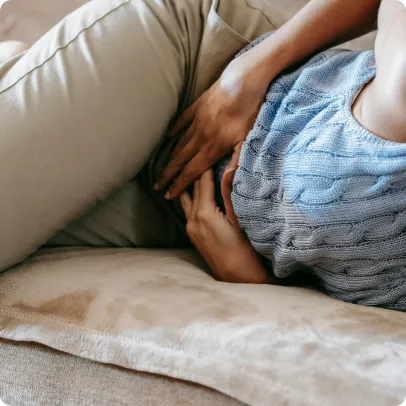
Menopause and Heart Palpitations

What are heart palpitations in menopause?
Feeling a flutter in your chest? Try not to panic—heart palpitations are surprisingly common during the menopause transition and beyond. Here’s what you should know.
Heart palpitations are simply irregular or unusual heartbeats. That can mean your heart flutters, skips beats, beats extra loudly, or begins pounding and racing for no reason. It’s possible that you’ll feel dizzy or lightheaded during heart palpitations. Although heart palpitations can affect anyone, they seem to appear more frequently during perimenopause and menopause. (Hence the name menopausal heart palpitations.)
Of course, menopausal heart palpitations are just one symptom you may experience during perimenopause and menopause. Others more common symptoms may include:
- Hot flashes and night sweats
- Depression, anxiety, and other mood changes
- Insomnia
- Vaginal dryness
- Lower sex drive
- Skin and hair changes
What Causes Menopausal Heart Palpitations?
- This is the million dollar question, and researchers don’t yet have a perfect answer. Generally speaking, irregularities in your heartbeat are caused by unusual or dysfunctional electrical stimulation from your nervous system. Why exactly this might become more common during perimenopause and beyond is unknown, but it’s believed that estrogen plays a key role.
- During your reproductive years, you have high levels of estrogen—a major sex hormone that affects almost every part of your body. During perimenopause, your estrogen levels fluctuate and begin falling. After menopause, estrogen falls to a low level and remains there for the rest of your life. This decline in estrogen during perimenopause triggers many of the classic menopause symptoms, including hot flashes, insomnia, and vaginal dryness—and potentially heart palpitations as well.
- Researchers have established that falling estrogen increases your risk of heart disease (which is why heart disease risk rises after menopause). Heart palpitations may be similarly triggered by falling estrogen levels and the loss of estrogen’s “cardioprotective” effect. In recent years there has been an upsurge of scientific interest in this topic, and we hope that the future brings more answers.
of Members report symptom improvement within 3 months.
care at your fingertips.

Who Is at Risk for Menopausal Heart Palpitations?
Menopausal heart palpitations can affect anyone, but some people are at higher risk. According to a major 2021 study, the risk factors include:
- Low income
- Low physical activity
- Past or current smoking
- Hispanic identity
Heart palpitations also seem to be worse among people who have other menopause symptoms, including hot flashes, night sweats, insomnia, and depression.
Could Heart Palpitations Be a Sign of a More Serious Heart Condition?
The short answer is yes, heart palpitations could be a sign of more serious underlying heart issues. Just because it’s possible, however, doesn’t mean it’s likely. Up to 46.8% of menopausal people report heart palpitations. In other words, this is a common complaint and in most cases not a worrisome heart condition.
That said, it’s better to be safe than sorry where your heart is concerned. Tell your healthcare team about your symptoms and they’ll help you figure out what’s really going on.
When to See a Doctor About Heart Palpitations
Talk with your doctor about your heart palpitations right away. If your palpitations are infrequent and don’t last more than a few seconds, there’s probably nothing more serious going on. Your doctor will be concerned about your palpitations if:
- They last longer than a few seconds
- They’re getting worse or more frequent
- You have a known history of heart disease
- Your family has a history of heart disease
Finally, you should also seek emergency medical care if:
- You have chest pain or discomfort
- You’re fainting or feeling faint
- You have severe shortness of breath or dizziness
of Members report symptom improvement within 3 months.
care at your fingertips.

What are some medical-provider-prescribed treatments for heart palpitations during menopause?
Hormone therapy is the most powerful and effective treatment available for hot flashes during the menopause transition, and it may also help prevent heart palpitations. The treatment uses estrogen to increase your declining hormone levels, thus preventing the estrogen withdrawal that triggers menopause symptoms. A 2022 study found that menopausal hormone therapy is the only available treatment that may be effective against heart palpitations.
What are some non-medical treatments for menopausal heart palpitations you can do at home?
Even if your healthcare provider determines that your menopausal heart palpitations are harmless, you might find them uncomfortable or distressing. If so, these strategies may help reduce the frequency or intensity of your palpitations.
Cut Back on Caffeine
Caffeine is a stimulant. And if you’ve ever had too much, you know that it can make your heart race. For some people, that’s a heart palpitation trigger. Try switching over from coffee to tea, and watch out for hidden sources of caffeine such as diet soda and dark chocolate.
Quit Smoking & Vaping
Nicotine (whether you get it from cigarettes, vape, or some other source) is a very powerful vasoconstrictor. This means it squeezes your blood vessels down to a small diameter, raising your blood pressure and creating a head rush. It puts a lot of strain on your heart to pump blood under these conditions, which may trigger or exacerbate heart palpitations.
Exercise Regularly & Don’t Overdo It
Regular exercise is one of the best things you can do for your heart. Specifically, moderate aerobic exercise seems to create the maximum heart health benefits after menopause. But exercising too hard can be a heart palpitation trigger for some people, so keep your workout intensity at a reasonable level.
Safeguard Your Sleep
High-quality sleep has been proven critical in maintaining heart health during the menopause transition and beyond. Practice good sleep hygiene by keeping your bedroom cool and dark, avoiding caffeine after 2pm, and only using your bed for sleeping.
Try Yoga or Meditation
Calming activities like yoga and meditation can slow down your breathing and reduce your heart rate, potentially helping you avoid heart palpitations. Research has also shown that yoga can improve other symptoms of menopause, such as hot flashes and insomnia.
Stay Hydrated
Getting dehydrated makes your heart work harder, so it’s important to drink plenty of water. Try keeping a bottle of water in your handbag, desk, car, and other convenient places. Electrolytes are also crucial for your body to retain water, so make sure you’re getting enough magnesium, calcium, potassium, and sodium in your diet.
The Bottom Line
Heart palpitations are incredibly common during menopause, and they don’t necessarily mean anything serious is wrong with your heart! Even so, you should always discuss cardiac symptoms with your healthcare provider. If you’re experiencing benign menopausal heart palpitations, menopausal hormone therapy may help address the underlying issue (estrogen withdrawal), while lifestyle changes can help you ease the symptoms.
What should you do next?
Let’s get you prepared to be paired with your provider!
Select and submit all of the symptoms you are currently experiencing so your doctor can assess and provide a tailored treatment plan for you.
of Members report symptom improvement within 3 months.
care at your fingertips.

References








